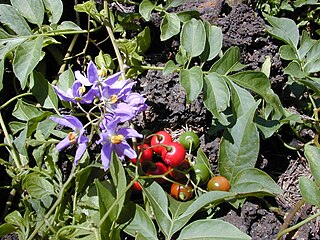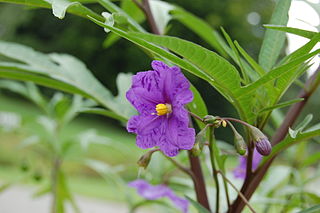Solanum may refer to
Solanum may refer to

The potato is a starchy root vegetable native to the Americas that is consumed as a staple food in many parts of the world. Potatoes are tubers of the plant Solanum tuberosum, a perennial in the nightshade family Solanaceae.

Solanum is a large and diverse genus of flowering plants, which include three food crops of high economic importance: the potato, the tomato and the eggplant. It is the largest genus in the nightshade family Solanaceae, comprising around 1,500 species. It also contains the so-called horse nettles, as well as numerous plants cultivated for their ornamental flowers and fruit.
Potato vine may apply to
Normania may refer to:
A potato, Solanum tuberosum, is a tuberous food crop grown throughout the world.
Wild potato may refer to:
Potato virus Y (PVY) is a plant pathogenic virus of the family Potyviridae, and one of the most important plant viruses affecting potato production.
Jasmin may refer to jasmine. It may also refer to:
Red gold is a gold alloy with at least one other metal.
Potato tree is a common name which may refer to several large species of nightshade, especially:

Solanum atropurpureum, commonly known as malevolence, purple devil and the five-minute plant, is a perennial herbaceous plant native to Brazil. S. atropurpureum contains various toxic tropane alkaloids in its fruit, stems, and leaves, and should not be ingested.
Native potato may refer to any of several taxa of tuberous flora:

Bintje is a middle-early ripening potato variety bred in the Netherlands by the Frisian schoolmaster K.L. de Vries in 1904 from and marketed for the first time in 1910. The name of the potato, a diminutive of Benedict, was borrowed from one of his former students.
Superior is a white-skinned, white-fleshed, mid-season potato variety. It was released by the University of Wisconsin potato breeding program in 1962, and is not under plant variety protection. It is a progeny of a cross between 'B96-56' and 'M59.44' and was first grown in 1951. 'B96-56' was also a parent of Kennebec. Like the potato variety Atlantic, Superior is widely grown for potato chip manufacturing right off the field and marketable yields are fairly high.

The Solanaceae, or the nightshades, are a family of flowering plants that ranges from annual and perennial herbs to vines, lianas, epiphytes, shrubs, and trees, and includes a number of agricultural crops, medicinal plants, spices, weeds, and ornamentals. Many members of the family contain potent alkaloids, and some are highly toxic, but many—including tomatoes, potatoes, eggplant, bell and chili peppers—are used as food. The family belongs to the order Solanales, in the asterid group and class Magnoliopsida (dicotyledons). The Solanaceae consists of about 98 genera and some 2,700 species, with a great diversity of habitats, morphology and ecology.

Solanum laciniatum a soft-wooded shrub native to the east coast of Australia, notably Victoria and Tasmania. It also occurs in Western Australia and New Zealand, where some authorities consider it to be introduced. It is similar to Solanum aviculare, with which it shares the common name kangaroo apple. The common name refers to the likeness of the leaf shape to a kangaroo paw print. This plant is currently being cultivated to produce corticosteroid drugs.
Chinese virus or China virus may refer to:
Solanum goniocalyx may refer to two different species of plant:
Bunchy top most commonly refers to:

Viral diseases of potato are a group of diseases caused by different types of Viruses that affect potato crops worldwide and, although they do not affect human or animal health since they are viruses that only infect vegetables, they are a source of great economic losses annually. About 28 viruses have been reported infecting potato crops. However, potato virus X (PVX), potato virus Y (PVY), and potato leafroll virus (PLRV) are the most important viruses worldwide. Some others are of economic importance only in some regions. Such is the case of potato virus M (PVM) in some Asian and European countries.